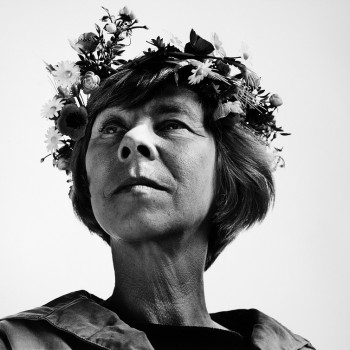Search results for "2010/02/2011/04/2009/10/writing-and-power"
Oedipus Cleverclogs
30 September 1997 | Archives online, Fiction, Prose
A short story from Ammattimies (‘The professional’, Tammi, 1997)
I had just pounded the life out of a couple of Germans when mother appeared at the door of my room, her blonde hair in a bun, in her white nightdress, through which I could clearly see the outline of her figure. She looked at me a little pityingly and suggested that we should go out for a meal at the weekend, just the two of us. I nodded and went back to concentrating on my acts of heroism.
And mother did not break her promise. Although she did not earn much as the junior cook at the children’s home, that did not stop us eating out. She took me to a good restaurant that was right on the harbour, in the shadow of the old steamships. The night before, she had ironed my only white shirt and hung it on a hanger with my terylene trousers. My mother had dressed me in the same outfit on my first day at school. I was decidedly over-dressed that day, but I put a good face on it. Mother’s men must always look their best. More…
The prisoner and the prophet
30 June 1997 | Archives online, Fiction, poetry
Poems from Timmermannen (‘The carpenter’, Söderströms, 1996). Introduction by Jyrki Kiiskinen
The greatest message
Reader, love is
a secret, waiting
for wind, not a choice
between loving or not.
As commandment, degraded
to demand, it will soon be
fanatic like a wound,
a form of hate. How
could a secret
become reality
without dying? Every
decree destroys its region. Made a law
goodness turns
into the protecting
skin, with which the good
touches everything. A demand
for understanding, that,
which we call wisdom,
makes of wisdom
an armour, a cold
father around us.
The real communication is
his life. Against evil stands
the tale of a face.
How could such a secret
become real
or die? More…
A toast before dying
30 June 2005 | Archives online, Fiction, Prose
Extracts from the novel Voin jo paljon paremmin. Tšehov Badenweilerissa (‘I already feel much better. Chekhov in Badenweiler’, Loki, 2004). Introduction by Hannu Marttila
I went to meet them Friday and I did not plan to take other patients that week. They had a small but comfortable room with striped wallpaper.
The Russian was a tall man, but stooped. It soon became apparent that his wife spoke fluent German because she was of German descent. That made it much easier to take care of things.
Of course I knew who the patient was. I have always enjoyed literature and other forms of art. I could play several pieces rather well on the piano. When I was younger I had even written a couple of stories set in the mountains, though I had never offered them for publication. As for Chekhov, I had read a couple of his stories that had just come out in German translation, and I had liked them quite a lot in a way, even though they of course reflected that characteristic Russian nature, with its vodka and untidiness.
The patient’s wife seized both my hands when I entered. It was a bit confusing, but not necessarily unpleasant.
‘Our name is Chekhov. We have come from Russia,’ the woman said in a strong, carrying voice. ‘I trust you’ve been told?’ More…
Mothers and sons
30 March 2008 | Archives online, Fiction, Prose
Extracts from Helvi Hämäläinen’s novel Raakileet (‘Unripe’, 1950. WSOY, 2007)
In front of the house grew a large old elm and a maple. The crown of the elm had been destroyed in the bombing and there was a large split in the trunk, revealing the grey, rotting wood. But every spring strong, verdant foliage sprouted from the thick trunk and branches; the tree lived its own powerful life. Its roots penetrated under the cement of the grey pavement and found rich soil; they wound their way under the pavement like strong, dark brown forearms. Cars rumbled over them, people walked, children played. On the cement of the pavement the brightly coloured litter of sweet papers, cigarette stubs and apple cores played; in the gutter or even in the street a pale rubber prophylactic might flourish, thrown from some window or dropped by some careless passer-by.
The sky arched blue over the six-and seven-storey buildings; in the evenings a glimmer could be seen at its edges, the reflection of the lights of the city. A group of large stone buildings, streets filled with vehicles, a small area filled with four hundred thousand people, an area in which they were born, died, owned something, earned their daily bread: the city – it lived, breathed….
Six springs had passed since the war…. Ilmari’s eyes gleamed yellow as a snake’s back, he took a dance step or two and bent over Kauko, pretending to stab him with a knife. More…
The Conference
31 December 1978 | Archives online, Fiction, Prose
A short story from Alamaisen kyyneleet (‘Tears of an underdog’, Karisto 1970). Introduction by Pekka Tarkka
Dr Smith said that he did not believe that any immediate threat of an invasion from Space was likely to arise for some time. Observations to date had given no support to the view that any such preparations had been put in hand. Technically they were of course ahead of us, but in his opinion there was no cause for panic. Nor could he endorse the widespread but naive assumption that any confrontation with beings from Space must inevitably lead to war. If human beings had reason to feel threatened, it was from each other that the chief threat came. He urged the Conference to work for a situation in which every country would be preparing for peace rather than for war. He said he had no wish to sound sardonic, but that he had noticed that when war was prepared for, it was usually war that ensued. More…
The lady who could fly
30 June 1989 | Archives online, Fiction, Prose
A short story from Kenkää suurempi jalka (‘The foot bigger than the shoe’, 1992)
A day came when she felt she could fly. You used technological gear and gadgets for flying, or meteorological shifts in the air masses: rising currents gave you a weightless ecstasy with the lightest of equipment. But that wasn’t it.
To begin with it was one of those typical flying dreams, which gradually extended into the waking state: she could feel it coming in her sinews, her nervous system, her cortex. She was acquainted with Freud and Jung and the other dream-interpreters of today. Characters in the myths and fairytales flew; cruel princesses flew on the wings of the storm; Gogol’s overcoats, Chagall’s lovers, cows and cats flew; and vampires – those last leather-winged flutterings of the prehistoric archaeopterix in the mud of the gene pool. More…
Being God
30 September 2006 | Fiction, Prose
Extracts from the novel Gud (‘God’, Schildts, 2006)
Side by side, wolves and antelopes graze on the juicy grass.
A deer playfully chases a lion through the bushes.
‘Can you do this?’
Adam crosses his arms in front of his chest and folds his hands back to front so that the right hand is on the left and the left hand is on the right. With his hands folded he twists them downwards and holds them out. Now they point to Eve, still folded, and still with the right hand on the left.
Eve tries. She succeeds, and laughs with delight.
A gentle breeze is blowing from the east, just strongly enough for the couple not to be troubled by the heat, but not so they would feel the need for clothes to keep them warm. More…
Eerikinkronikka [Eric’s Chronicle]
6 March 2014 | Mini reviews, Reviews
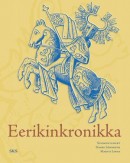 Eerikinkronikka
Eerikinkronikka
[Eric’s Chronicle]
Finnish translation by Harry Lönnroth, Martti Linna
Helsinki: Suomalaisen Kirjallisuuden Seura [Finnish Literature Society], 2013. 221pp.
ISBN 978-952-222-445-3
€35, hardback
Eerikinkronikka (Erikskrönikan) is both an important source of knowledge about Finland’s medieval history and a chivalric epic poem. The Old Swedish text was possibly written during the 1320s by Duke Eric’s secretary, the priest Torkel Kristinsson. Philologist Harry Lönnroth and historian Martti Linna have translated the work into Finnish for the first time, in prose form, with an extensive introduction by Lönnroth. The epic depicts the political history of Sweden in the 13th and 14th centuries, and also the struggle for power within the family of the well-known statesman Birger Jarl (died 1266). One of the central characters is the idealised Duke Eric (died c.1318), whose son becomes King Magnus Eriksson. The narrator comments on events in a laconic style that often has a religious tinge. The epic gives a vivid and dramatic account of chivalric life and life in the kingdom of Sweden, of which Finland was a part. At the time the Swedes were consolidating their power in Finland; the work mentions Birger’s ‘crusade ‘ to Häme in southern Finland, the founding of Häme Castle, and battles in Karelia.
Translated by David McDuff
Nature boy
15 September 2011 | In the news
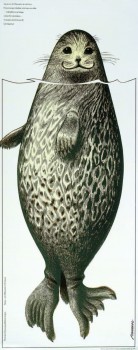
Seal signed: Saimaa ringed seal by Erik Bruun
The graphic artist Professor Erik Bruun has been awarded the Luonnotar / National Spirit of Nature Award for 2011.
The prize, established by the Puu kulttuurissa / Wood in Culture Association in 2001 and now worth € 12,000, is awarded bi-annually to Finnish professionals of any field of culture whose work has helped to make the public in Finland and abroad more aware of Finnish culture, heritage and environment.
Erik Bruun (born 1926) – who was the Art Editor of Books from Finland from 1976 to 1989 – is perhaps best known to the public for his numerous posters and advertisements, in particular his nature posters for the Finnish Association for Nature Conservation: the Saimaa ringed seal, the bear, eagles, owls, seagulls and other birds.
Bruun’s interest in nature photography, drawing, etching and lithography have long combined in his work for the Finnish wood processing industry as well as in his illustrative work for magazines and books and in designing postage stamps and banknotes.
A book on his life’s work, Sulka ja kynä. Erik Bruunin julisteita ja käyttögrafiikkaa (‘The quill and the pen. Posters and graphics by Erik Bruun’) by Ulla Aartomaa was published in 2007 (and reviewed in Books from Finland 3/2007). Take a look at his work on his home page.
The forest folk’s trip to Helsinki
26 March 2015 | Children's books, Fiction
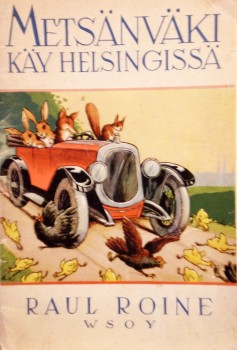 The country comes to town in this coyly modern fairy story of 1937 by the classic children’s writer Raul Roine (1907-1960). Reynard the Fox, the village taxi-driver, celebrates restoring his beat-up old Ford by taking his woodland friends – squirrels, chaffinches, bobtails… – on a day out to Helsinki. Trouble starts when a policeman tells them off for eating the plants in the Esplanade park, but the fun really begins when the hares find themselves participating in the marathon which is being run through the city streets that day…
The country comes to town in this coyly modern fairy story of 1937 by the classic children’s writer Raul Roine (1907-1960). Reynard the Fox, the village taxi-driver, celebrates restoring his beat-up old Ford by taking his woodland friends – squirrels, chaffinches, bobtails… – on a day out to Helsinki. Trouble starts when a policeman tells them off for eating the plants in the Esplanade park, but the fun really begins when the hares find themselves participating in the marathon which is being run through the city streets that day…
The translation of this delectable tale is by Books from Finland’s long-time collaborator Herbert Lomas (1924-2011), who was often at his best when working on the whimsy of children’s literature.
Spring had come to the forest homeland. The wood anemones were raising their heads shyly from under the moss, large tears of joy were flowing down the spruce trees’ beards of lichen, and sky-ploughs of cranes were coming from the south. They bugled mightily on their trumpets and then landed in the Great Marsh to sample the cranberries More…
On stage in New York
28 May 2010 | In the news
Puhdistus (2007), a play by Sofi Oksanen that also became a award-winning novel (2008), will be produced at the prestigious La MaMa theatre in New York in February 2011 under the title Purge. The director is Zishan Ugurlu, La MaMa’s Artistic Director.
Next month, Purge will be read in Chicago where the conference of the Theatre Communication Group of American professional theatres takes place. In September the play – which is set in 20th-century Estonia – will also be prèmiered in Tartu, Estonia. The novel was published in Estonian translation last year. Purge was published in English this April by Grove/Atlantic, translated by Lola Rogers. So far translation rights have been sold to 28 countries.
The play has been translated into English by Eva Buchwald, dramaturge at the Finnish National Theatre, where Purge was first produced in 2007. No Finnish play has ever before been produced on a professional stage in the US.
Getting by
18 May 2012 | Non-fiction, Reviews
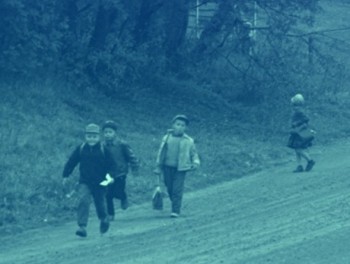
To school: children on the march – no buses or taxis in the Finnish countryside after the war. Photo: the cover of Kauaksi kotoa
Kauaksi kotoa. Muutoksen sukupolvi kertoo
[Far from home. Stories of the change generation]
Toim. [Ed. by] Anja Salokannel & Kaija Valkonen
Helsinki: Kirjapaja, 2012. 320 p.
ISBN 978-952-247-291-5
€32.90, hardback
The post-war period in Finland was a time of hope and reconstruction, of procreation and tough, grey heroism. Finland picked itself up by the bootstraps, as fathers who had been ‘driven mad in the war’, who took to drink or spat blood because they had shrapnel in their lungs, built veterans’ houses around the small towns and cleared fields in the backwoods. More than 83,000 men were killed in the wars (Winter War 1939–1940, Continuation War 1941–1944).
Mothers worked like men. The baby boomers – the demographic peak which consists of those born between the war years and 1950 (in 1946–1949 more than 100,000 babies were born each year, compared to some 60,000 in 2011) – had to be fed and clothed and educated for a better and more prosperous future.
Now the baby boomers have started to retire. Editors Anja Salokannel and Kaija Valkonen (baby boomers themselves) have compiled the book Kauaksi kotoa. Muutoksen sukupolvi kertoo (‘A long way from home. Stories of the change generation’), in which 21 men and women talk about their lives during the decades of change. More…

